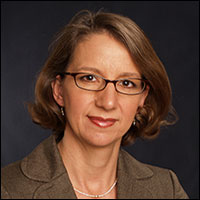New approaches to engineering design are needed to solve inequities in global health care, according to a widely-acclaimed bioengineer who tackles neonatal health and cancer mortality in low-resource settings in the United States and Africa.

Rebecca Richards-Kortum will deliver the Vanderbilt University School of Engineering’s John R. and Donna S. Hall Engineering Lecture Monday, Jan. 25, at 4:10 p.m. in Jacobs Believed in Me Auditorium, Featheringill Hall. A reception will follow the lecture.
Richards-Kortum, Malcolm Gillis University Professor at Rice University, is the director of Rice 360°: Institute for Global Health and the Rice Institute of Biosciences and Bioengineering. She is known for providing vulnerable populations access to life-saving health technology, focusing on diseases and conditions that cause high morbidity and mortality, such as cervical and oral cancer, premature birth, and malaria.
A trip to the tiny, impoverished African country of Malawi a decade ago crystalized Richards-Kortum’s understanding of global health problems when the country’s unreliable electricity blinked out in the newborn intensive care unit, idling the machines that helped premature babies breathe. The medical realities of newborn care in Malawi caused an abrupt turn in her career.
“If we are to resolve global inequities in access to innovations that improve health, we must adopt new approaches to engineering design that reflect the unique needs and constraints of low-resource settings,” she said.
In her lecture – “From Brownsville to Blantyre: Designing Appropriate Technologies To Improve Healthcare in Low-Resource Settings” – Richards-Kortum will describe her programs’ approaches to design appropriate technologies to improve neonatal health and reduce cancer mortality in areas characterized by a lack of funds to cover health care costs whether by individuals or by their communities.
“In our experience, successful and sustained adoption of appropriate technologies requires both new approaches to engineering education and public-private partnerships,” Richards-Kortum said.
After returning from Malawi in 2005 she began a program called Beyond Traditional borders, which challenged students at Rice to come up with practical solutions to real-world problems in the developing world.
The first thing Richards-Kortum and her students focused on was the development of a bubble CPAP system that allows newborn babies with respiratory problems to breathe. Premature babies born in developed countries routinely are put on CPAP machines and most survive. But the $6,000 machines are too expensive for hospitals in developing countries. The Rice researchers developed a simple, more robust bubble CPAP that costs about $160.
The device has been implemented at all government hospitals in Malawi, and introduced in Zambia, Tanzania, and South Africa. In 2014, CPAP was recognized by the United Nations as one of 10 innovations that can save the lives of women and children now.
For two decades, Richards-Kortum has focused on translating research that integrates advances in nanotechnology and molecular imaging with microfabrication technologies to develop optical imaging systems that are inexpensive, portable, and provide point-of-care diagnosis. This basic and translational research is highly collaborative and has led to new technologies to improve the early detection of cancers and other diseases, especially in impoverished settings.
Richards-Kortum’s work in appropriate point-of-care screening technologies has earned her induction into the National Academy of Engineering, the National Academy of Sciences, the National Academy of Inventors, and the American Academy of Arts and Sciences.
Richards-Kortum’s research group develops miniature imaging systems to enable better screening for oral, esophageal, and cervical cancer and their precursors. She led development of a novel high-resolution microendoscope capable of real-time, subcellular imaging of epithelial tissue. The group also has developed low-cost sensors to detect infectious diseases at the point-of-care, including HIV, cryptosporidium, malaria, and Tuberculosis.
She is the recipient of numerous awards, including the Presidential Young Investigator and Presidential Faculty Fellow awards from the National Science Foundation, Y.C. Fung Young Investigator Award from the American Society of Mechanical Engineers, and she was named the Pritzker Distinguished Scientist and Lecturer of the Biomedical Engineering Society’s 2010 Annual Meeting.
Prior to joining the bioengineering faculty in 2005 at Rice University, Richards-Kortum held the Cockrell Family Chair in Engineering and was a professor of biomedical engineering at the University of Texas at Austin, where she was also a Distinguished Teaching Professor. After receiving a B.S. in physics and mathematics from the University of Nebraska-Lincoln, she continued her graduate work at the Massachusetts Institute of Technology, where she received an M.S. in physics and a Ph.D. in medical physics.
The John R. and Donna S. Hall Engineering Lecture Series was established in 2002 to allow Vanderbilt School of Engineering students hear renowned engineers from universities and agencies address engineering topics of particular interest. The series is funded by an endowment founded by James Gray to honor the Halls. John Hall, a 1955 Vanderbilt engineering graduate, is retired chairman and chief executive officer of Ashland, Inc. The 2016 spring lecture is co-sponsored by the Vanderbilt Biophotonics Center.
+++
Blantyre is Malawi’s second largest city and considered its commercial capital. There are an estimated 1,068,681 inhabitants as of 2015. Malawi is a landlocked country in southeast Africa with an estimated population of almost 17 million (2013). It is bordered by Zambia to the northwest, Tanzania to the northeast, and Mozambique on the east, south and west. Brownsville, Texas, has one of the highest poverty rates in the United States, and is frequently cited as having the highest percentage of residents below the federal poverty level out of all cities in the nation.
Contact:
Brenda Ellis, (615) 343-6314
Brenda.Ellis@Vanderbilt.edu